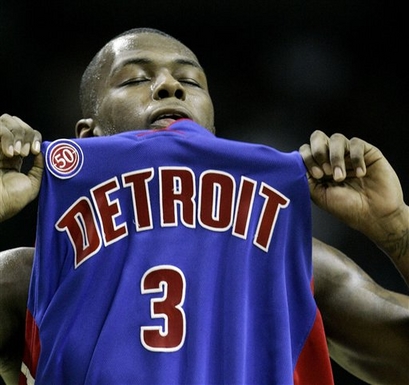 ON BASKETBALL
ON BASKETBALLI never thought the moment would come when I would lose all my faith in the defending-champion San Antonio Spurs.
Even prior to Game 5, with the Spurs facing a 3-1 series deficit and a road game in L.A., I told the mailman Thursday afternoon, "I'm not counting them out." And I certainly felt that way when I turned on the game midway through the second quarter and saw San Antonio 33, Los Angeles 16.
But as the game progressed, I realized the Spurs' fate. They would lose that lead, and lose the series and, ultimately, probably not win another championship with their current core.
Thank Kobe Bryant's Lakers for this.
When the season began, there were so many questions swirling around Bryant and the Lakers. The one nobody was asking: "Does this team have a chance to win a championship?" (If asked, the answer would have been a resounding, "Nope.")
One thing I was wondering: "Is Kobe Bryant the best player in the NBA?" What with LeBron James coming off his first NBA Finals appearance at the ripe age of 22 and even Dwyane Wade already blinging a championship ring, I had serious doubts.
Not anymore. Bryant is clearly the best player in the association, and, not coincidentally, he plays for the best team.
Don't get me wrong -- either Boston or Detroit will give the Lakers a great series, a Finals David Stern has been hoping for. But the difference will be Bryant.
He has an unbelievable feel for the game that he used to lack. Remember Game 7 against Phoenix two seasons ago? Bryant basically quit, refusing to shoot the ball during an embarrassing blowout. Now, at 29, Bryant knows when he must take over a game offensively and when to get his teammates involved.
And when he gets that fierce look in his eyes, he's virtually unstoppable. Bruce Bowen is supposed to be one of the league's best defenders. Bryant made him look old and slow in scoring 39 points from all over the court in LA's 100-92 victory.
It was a case of good defense getting beat by extraordinary offense.
Bryant could pull up and shoot over Bowen whenever he liked. And he could do it from anywhere -- 25 feet or 12 feet. Additionally, he does such a good job of keeping his dribble alive, that double-teams become useless because the big man who creates the double -- Tim Duncan for the Spurs -- can't stay with Bryant. Kobe showed this with a pair of drives right past the two-time MVP Thursday.
What was even more scary in the closeout game, however, was Bryant's fitness level. He didn't miss a minute of the second half, and yet he got better in the fourth quarter. If he can show that kind of endurance on one day's rest, imagine how much energy he'll have when the Finals commence in a week.
Simply put, when the Lakers have Bryant on the floor, they are the better team. The supporting cast is rock-solid, but even when Lamar Odom and Pau Gasol are on the bench, Bryant can control a game.
The only player I've watched in my lifetime whom the current Kobe reminds me of? Yep, you guessed it. (And if you didn't, look up the greatest players of all time.)
There are no weaknesses to Bryant's game. Early in his career, his outside shot needed work. Two years ago, he was called selfish and a bad teammate (and rightfully so) -- heck, people were even saying that after last season.
But something clicked in Kobe's head at the beginning of this season. No, the addition of Gasol didn't make Bryant who he is. It was before that, when Bryant was helpingAndrew Bynum look like a future All-Star. He saw that his teammates were working almost as hard as he was to make the team successful, and he gained a trust in them.
It's obvious that Bryant shares more than supreme talent with M.J. It's their competitiveness that stands out. (If you don't believe me, read this Sports Illustrated article.) That's why both players had a hard time dealing with an underachiever like Kwame Brown. They couldn't understand why he wasn't getting the most out of his ability.
But now, equipped with very capable teammates and one of the NBA's greatest coaches, Bryant has all he needs to play the lead role in this success story. And don't expect the show to end anytime soon. Don't think that Bryant's fourth NBA championship this spring will be his last.
By the time he's hung up No. 24, he might have more rings than a certain No. 23.









